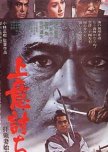
Esta resenha pode conter spoilers
"Each must live his own life"
In Samurai Rebellion, there was a rebellion, but not of swords and muskets, a rebellion against the rigid samurai code that the local lord had subrogated with tyrannical orders levied according to his whims. Three people stood up for the injustice done to them in the name of order and tore down the societal walls suffocating them in order to be individuals with their own wills and to fight for their basic human rights no matter the cost.The film begins with samurais Sasahara Isaburo (Mifune Toshiro) and his buddy Tatewaki (Nakadai Tatsuya) grumbling about how boring their lives are in the equivalent of middle management jobs for the local lord. Isaburo is in charge of cleaning and counting the weapons in the local artillery while Tatewaki is a glorified gate guard. Isaburo has been stranded in a loveless marriage for 20 years to a harridan who rules the household with a sharpened steel tongue while he plays along to keep the peace. Upon arriving home, he receives orders from the lord that his oldest son, Yogoro, is to marry the lord's dismissed concubine. Lady Ichi was rumored to have gone wild when she saw the lord with another woman even striking him and tearing at his clothes. Isaburo seeks a way out for his son, not wanting to relegate him to the same marital hell he's lived in. Yogoro realizes the penalty for refusing and acquiesces. In a turn of good luck, Ichi is actually the perfect wife and she and Yogoro fall in love and have a daughter, Tomi. When questioned about her behavior with the lord, it turned out that the lord had given her no choice and forced her to be his concubine even though she was engaged and 30 years younger than he was. Their marital bed was torment for Ichi, "like dragging a pure silk kimono through the mud".
Isaburo retires and makes Yogoro the head of the household. Just as everything is going well, the lord's son dies leaving only Ichi's son she had to leave behind as an heir. The heir's mother could not be married to a vassal so she was ordered to return to the castle. Isaburo had gone along with his wife and lord in everything they'd ever asked no matter how degrading. Seeing his son and daughter-in-law having the kind of love he'd never experienced lit a fire in the retired samurai. Breaking up a loving family at the lord's capricious notion was cruel and barbaric and one too many slashes against the family's honor. Though there were family councils and political councils held advising them to comply, the three stayed strong in refusing until Ichi was kidnapped and returned to the lord. At this point, Isaburo and Yogoro knew the score. The lord's actions would be frowned upon by other daimyos and the shogunate if discovered but getting the information to Edo would be perilous. The lord's men approached Tatewaki and asked him to kill Isaburo, knowing he was the only man who stood a chance against him. Tatewaki told them to negotiate or there would be a mountain of dead men.
The gun on the mantel at the beginning of the film was the lord stating that Isaburo and Tatewaki would never fight because it would hurt the family of whoever lost. You know before the final credits, the two will battle. And by the time the fight against the lord's men begins you will also be blood thirsty for the mountain of dead men after all of the sorrow and suffering.
Tsukasa Yoko as the Lady Ichi was the emotional glue holding the story together as she finally found a safe and loving place to call home and also had to show determination in the face of insidious threats. Mifune Toshiro gave one of his best performances. Initially, he was the henpecked husband with little to live for and slowly gained the fire and fierce attitude we are used to seeing in his samurai characters. Not only true love, but human honor beyond the samurai code was worth fighting for. As he determined to break the rules, he was seen walking on the carefully raked sand in the courtyard instead of on the path. The symmetrical and even lines in the house were purposely carved and nailed askew in defiance of the classic norms. Isaburo also gained a self-confidence beyond his skill with a sword. "For the first time in my life I feel alive!"
Samurai Rebellion blended low key romance, family drama, and political drama in a battle against corruption and a rigid, unyielding system that demanded complete obedience even in the face of abuse and cruelty. There was no cathartic ending, the three main characters were aware where their fate lie and embraced it. They knew the consequences for their act of rebellion for themselves and their families, they simply could no longer tolerate being treated as inhuman. This film was a story of love and the need for dignity which also happened to also be a samurai film. Well worth seeking out if you like old films or Mifune Toshiro.
5/15/23
Esta resenha foi útil para você?

Esta resenha pode conter spoilers
Uneven romantic comedy
Wild Rose was a romantic comedy highly influenced by Japan's invasion of the country. The understandable propaganda due to the crisis, juxtaposed to the comedy could come across as a strange combination.Wang Ren Mei made a delightful Wild Rose. Living in a small village with her father, Xiao Feng was vivacious and always with a smile on her face. Jiang Bo/Po, an artist from a wealthy family drives his fancy car into town and while painting pictures of the rural landscape becomes smitten with the wild girl. About this time Xiao Feng's father fights with a creepy old creditor who wants to buy Xiao Feng to square his accounts. Her father accidentally kills the man as the hut catches on fire. When he escapes and runs away it leaves Xiao Feng to believe he is dead. Jiang takes the newly orphaned Xiao Feng back to the city with him. He gives her a makeover before taking her home so that his father will accept her. After she commits a faux pas the father orders her out and Jiang went with her.
The coddled Jiang was introduced to how the other 99% live. With two low income friends they found a place to live already housing ten families run by a cranky landlady. Without his father's influence and connections, Jiang was unable to sell his paintings and turned to painting billboards. At first everyone was smiles and holding hands and then the unforgiving winter set in and the more unforgiving landlady. Playing housekeeping in poverty turned out to be a hardship with life and death on the line. Xiao Feng picked up a wallet dropped by a drunk but was chased by the police. Jiang and one of their friends take responsibility and are thrown in jail. Xiao Feng goes to Jiang's father, accepts full responsibility for his son's actions and promises to never see him again if he will save his son. Jiang's father agrees. Afterwards, Jiang and the boys search relentlessly for Xiao. In the end, when the movie takes a 90 degree turn, as support for the volunteer army is being drummed up, Jiang once again leaves home, this time for his country. In the recruiting parade are his old buddies and Xiao Feng. Even war can facilitate romance!
The print I watched was in bad shape with many scenes too dark to make out or cut off mid-frame. The acting overall was good, some better than others. This version had no music accompanying it.
Though it felt like we were supposed to side sympathetically, maybe even politically with the Wild Rose and eschew the filthy rich who focused on keeping the classes divided, the scenes involving the wealthy seemed lovingly luxurious. Only at the end when Jiang stepped away to pay attention to the volunteer parade did the oblivious dancing stop. The aristocrats seemed completely out of touch with what was going on in the streets. The military scenes and even the song and military inspection Xiao Feng performs with the children in her village could be jarring. "To love China is to love your mama!" Given their country was under attack it seemed reasonable to appeal patriotically to the audience even if it caused the movie to shift out of balance at times and could be heavy handed.
Wild Rose had some charming and inspiring moments interspersed, but overall felt uneven emotionally and narratively. As challenging as the degraded film could be to watch, most likely this is a film for silent film buffs or those who are fans of the director and/or cast.
5/11/23
Esta resenha foi útil para você?
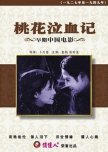
Esta resenha pode conter spoilers
"Like teardrops, the petals from the peach tree fall..."
The Peach Girl was a tragic tale of forbidden love between the classes. Ruan Ling Yu and Jin Yan made for a beautiful and tormented couple in this classic silent film.Miss Lim (Ruan) and her parents worked on a large property. When Lim was a baby her mother planted a peach tree saying it was a symbol of her child's life. If the little girl was good it would blossom. Lim and the owner's son, Teh En, became friends despite his mother's disapproval. Even at the tender age of five, love blossomed along with the peach tree. Teh En moved away, later returning as a young man. He and Lim reconnected and their love continued. His mother still did not approve. Teh set Lim up in an apartment and told her his mother was going to let them marry. This was a bold-faced lie because his mother was arranging another marriage for him. When Lim's father found out what was going on and that Lim was pregnant, he confronted Teh En's mother who offered to pay them off. Insulted, Lim's father refused the money and was fired for his efforts.
"A man's life might be easily altered by circumstances." Teh En begs his mother to let him marry Lim and she responds by locking him up in their mansion. This was more in mind than physically because she was half his size and constantly shaking from her opium addiction. He could have easily pushed past her at any time. Teh's mom is worried about their "social dignity" more so than their familial integrity. Teh believes that "wealth or poverty does not come between love" but in real life that isn't always true, especially when descending from wealth into poverty and for a man who never worked a day in his life.
While Teh's mom tries setting him up with other girls Lim has their daughter. By this time Lim's mother has died and her father has been blinded. Melodrama thy name is Peach Girl. Lim's landlady attempts to pimp her out to an old man but upon seeing the peach blossoms she determines to stay strong.
"Sickness invariably visits the poor and helpless" especially in a Chinese silent films. Lim lays dying and Teh finally gains enough courage to push past his overly dramatic mother to run and stumble and run and stumble and run and stumble to the woman he loves. With Lim's last breath Teh promises to live to take care of their child and stand up to his mother.
The intertitles were beautifully decorated and had dialogue in English and Mandarin. In the version I saw there were also simpler English translations beneath for some intertitles. The print I watched had no music. I've read that silentfilm.org has added music on a DVD they released. By this time in Hollywood most movies, with the exception of Charlie Chaplin movies, had sound. Possibly due to access issues, lack of theatrical infrastructure, and Japan invading Manchuria in 1931, the Chinese were slower to add sound. Many frames were badly faded but did not take away from my experience.
Ruan Ling Yu's expressive face and the timeless story adapted well to silent film making the story easy to follow. This was not the best performance I've seen by Ling Yu, at times it was hampered by the thick white theatrical makeup. Without the gift of spoken words, she still conveyed a wide range of emotion brilliantly emoted through her facial expressions and body language.
Peach Girl's story at this time in history feels overly familiar, but in 1931 might have felt fresher. Perhaps due to the hard times, the plight of an abandoned woman often left with a child and living in poverty was a common theme in many of the surviving silent films I've watched. More often than not the woman was criticized by society but not the filmmaker as the film called out for audience sympathy. In this film, the director and writer highlighted the discriminatory gap between the classes. "Class distinction does not exist among children." The lesson was nearly always learned after a high price was paid.
The Peach Girl was entertaining and worth checking out if you enjoy older films and Ruan Ling Yu's performances. The alternate title, Peach Blossom Weeps Tears of Blood might have been more accurate for this film. "Observe how teardrops are petals of the peach tree…the peach tree speaks of love, of sorrow, and of tears."
5/11/23
Esta resenha foi útil para você?

Esta resenha pode conter spoilers
"It's only human to pretend nothing is wrong"
Director Naruse Mikio dissected a lifeless marriage without really digging into the reasons for the spouses' lack of fulfillment. Both lamented internally that they had no idea what their spouse was thinking and neither had the courage to ask. They were living in a Groundhog Day where every day was exactly the same and neither knew how to break out of the cycle of misery.Toichi is a salaryman who never moves up and doesn't seem particularly interested in further success. In order to make ends meet, he and his wife rent out rooms in their house to an array of eclectic tenants. His wife, Mihoko, also sews/knits to earn extra money. While Toichi doesn't care whether the tenants pay their rent on time Mihoko is more practical. They bring in enough money for the basics but don't seem to ever leave their small living area. Married for ten years, they have no children and apparently no disposable money for attending movies, plays, concerts, or even going to restaurants. Mihoko's world resides in their cramped living quarters. Only the gossip from the artist who lives across the hall and the feuding couple upstairs brings any entertainment into her life. For Toichi and Mihoko, they have nothing to divert themselves or share together, they have only each other and neither has made the effort to reach the other emotionally.
Toichi is approached by Sagara, a young secretary in his office, to attend an art gallery. They have coffee and spend time together before she returns to Osaka to live with her family. On a business trip to Osaka with his boss, Toichi seeks out Sagara only to find she has a young son. They end up spending the night at an inn. Sagara is not only drawn to Toichi's looks but also the security he could bring. Whether Toichi was really in love with her or in love with the idea of a different life lived was difficult to tell. Mohoko was aware he was seeing Sagara and puts her foot down. Even his father-in-law visits him to discover his intentions. Whether Toichi would divorce his wife or simply have Sagara as a mistress was never revealed.
The film did show women either working or seeking a way to make a living on their own. One of the tenants supported her unemployed husband and mother-in-law by working as a bar hostess. Sagara intended to open a dress shop with a friend partly funded by an uncle. Mohoko could not fathom a way to be financially independent and at her age she would be unlikely to find a new mate. While much was brought up about women becoming independent by opening a shop, that move requires capital and a lot of luck. Perhaps that type of endeavor was too risky for Mohoko who would be left without a safety net.
Toichi held the power in the relationship. Men still dominated the workforce at the time and Toichi could always find a younger wife. Female characters constantly rhapsodized what a fine catch he was. It was also brought up that Mohoko wasn't a very good cook, didn't apply her makeup correctly, was old-fashioned, and too cranky. Her husband must be involved with someone else because she wasn't a good enough wife. Toichi worked, ate, and went to bed, scarcely acknowledging his wife's existence and leaving much of the job of being a landlord up to her. Despite the fact that he was in the wrong having an affair, with Mohoko clearly in distress, at no time did he ever show a modicum of sympathy or concern for her. In matters of the heart and in financial matters, he rarely displayed any valor. And while much was made about male pride, Mohoko asked what about her female pride and why did everyone want her to apologize and turn a blind eye to Toichi's affair.
Naruse didn't seem to take sides in this cynical view of marriage though attitudes toward Mohoko certainly reflected the times. Of the three marriages shown, one ended in divorce, and another one in suicide. Toichi cheerfully imagined that they could both have fresh starts with a divorce. Mohoko felt trapped, knowing her husband no longer loved her and that she no longer trusted him, but unable to move on alone with no financial security. Even with divorce becoming more acceptable there were societal norms that she was unwilling to step outside of which would relegate her to a loveless marriage.
By the close of the film, Toichi and Mohoko were inhabiting a silent world, going through the motions, miserable but unable to find any hope for a better life. " Wife" ended where it began, only in a worse version of a day repeating itself with the people involved still unaware and unable to remedy their unhappy situation. Though there were moments of comedy supplied by supporting characters, the film was a dark, bleak look at married life with few sympathetic characters.
5/8/23
Esta resenha foi útil para você?

Esta resenha pode conter spoilers
So bad, it's just bad
Some movies are so bad that they are good. The Invisible Terrorist almost made the cut in this category if not for two disturbing scenes that downgraded it in my view. Too bad, I'm always up for some Carter Wong kung fu action and ridiculous weaponry and plot lines. The Invisible Terrorist delivered in those areas.Once again, Ming rebels have a secret list of their members that for some reason they are carrying around and the evil Qing, of course, want to steal it. Poor Lo Lieh, in what amounts to a guest role, is taken out by a Qing ambush within the first ten minutes of the movie. Wang Hsieh is a turncoat Ming general working for the other side along with Chin Kang and Lung Fei. A Shaolin monk who is a rebel leader gives Carter Wong the secret rebel list. The monk tells him that there is a traitor among them called the Deadly Blade. During an attack, the monk is killed as the rebels escape. Carter divides the list between himself and Cliff Lok and Wen Chiang Long. From there the story amps up the bizarro plot lines.
What ruined this film for me is when Carter's character is captured and his sister is brought in to persuade him to give the Qing the list he has hidden, he brutally rapes his sister to prove that she isn't his sister. The only thing that it proved to me was that he was a vicious pervert. Even plot-wise it didn't make sense as they were alone in a prison cell and he was rescued about two minutes after the fact. Later, a number of pigeons were killed. So, if incestual rape and animal cruelty trouble you, I would recommend you not watch this movie.
It really was a shame because this movie has one of the most bonkers plotlines I've seen in a kung fu film, not good, but so bad it was funny. The number of double crosses and "I know something you don't know!" reveals kept going right up to the end credits. In an ode to school band members, one of the deadly squads of assassins was called The Six Cymbals. They were impervious to swords and defeated their opponents with the loudest most annoying weapons ever. Another squad was called The Six Whips. They too, had loud annoying weapons impervious to swords. But they had a weakness---bamboo!
Loud annoying weapons, rape, animal cruelty, the makers of this movie knew how to ruin a perfectly convoluted kung fu good time. My advice is to skip this one. I wish I had.
5/5/23
Esta resenha foi útil para você?
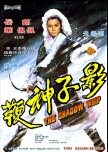
Esta resenha pode conter spoilers
"We'll have to fight our way out!"
Cheng Pei Pei was one of Shaw Brothers big female stars after the success of Come Drink with Me. This time instead of a sword she wielded a deadly whip in the snow for The Shadow Whip. While the film didn't break any new ground or have memorable fight choreography it was fun and stocked with plenty of familiar faces for kung fu fans.Shadow Whip opened with stunning mountain scenery shot in the snow. It was a rare departure for SB using this kind of outdoor scenery for a big part of a movie. Pei Pei played, Miss Yun, the "niece" of a secluded inn keeper who would turn out to be the infamous Shadow Whip, Fang Cheng Tian played by Tien Feng. Ku Feng as Chief Hong, Wang Hsieh as the leader of the Serial Trio, and Yueh Hua as the earnest Wang Jian Xin all collide with Miss Yun and her comic sidekick Er (Li Kun) violently at a local inn. Later Chief Hong, the man who cast no footprints in the snow, would show up at the isolated inn owned by Miss Yun's uncle. At this point everyone believes that her "uncle" is the legendary Shadow Whip who stole 300,000 taels worth of jewelry 15 years ago, killing a respected official's family in the process. Wang's uncle had been the head of the escort service for the transport who was ruined after the theft and murders. Hong and Wang are out for revenge and a plethora of others are on the hunt for the Shadow Whip in order to steal the stolen jewels.
Miss Yun comes home at one point to find people murdered and she is surrounded by bandits led by Kao Ming. "Are you officials?" "We're the bandits of Yan Yun. I trust Fang Cheng Tian has mentioned us." She did not look frightened, more like, 'Only 16? You should have brought more men'. Her uncle showed up and the two of them made short work of the bandits with their powerful and lightning-fast whips. Later that night she takes a message to Wang and they are surrounded at the inn by what looks like all the men in the region. "We'll have to fight our way out!" It's a martial arts movie, we'd expect nothing less. Chief Hong becomes determined to kill Miss Yun when he discovers her real family name is Yang. Mmm… let's see… it's Ku Feng with a maniacal evil laugh, he's hanging out with Wang Hsieh, and keeps trying to kill the heroine. Even with Tien Feng playing the Shadow Whip it doesn't take much to connect the dots to see who the real bad guy is.
The fights were mostly with swords and the aforementioned whips. The whips were used creatively to cause much bodily harm even if it wasn't always logical or physically possible. Swords, spears, and bodies were propelled with deadly and dismembering results! The sword-fights were slightly above average for the era. And 30 years before Crouching Tiger, Hidden Dragon, this film had a flying battle in the trees. Being a wuxia, there was quite a bit of light body flying. Despite having decent sets, you could see the wires in several scenes. Pei Pei is one of my favorite action heroines. She battles fiercely and doesn't look out of place with a weapon in her hand. Even better, she was allowed to take vengeance on her enemy instead of leaving it up to the men.
The snowy scenes were beautiful and nicely highlighted the bloody battles played out on the glittering ground. Horses were ridden through the deep snow up and down the mountains and in the forests. During one scene it was nice that the snow plow from ye olden times must have cleared off the road for the horses though it would have been nice if they'd covered the tire tracks.
Yueh Hua was less stiff than usual and quite energetic in his fights. Pei Pei was gorgeous, fluid and agile in her movements, always a delight to watch. Tien Feng, normally cast as a baddie made a sympathetic whip fighter. And I'm always happy to see Ku Feng who seemed to be having a good time with this role.
The Shadow Whip wasn't a great martial arts film but the fights and plots twists were fun and Pei Pei brought her A game as always. I grade old niche movies on a curve. This film was about average but I gave it an extra bump for the spectacular scenery and a proper ending. No frozen frame as the killing blow was landed!
4/27/23
Esta resenha foi útil para você?
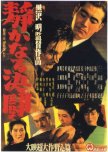
Esta resenha pode conter spoilers
"Misfortune makes people stubborn"
The Quiet Duel was the second collaboration of Kurosawa Akira and Mifune Toshiro. The story was told from a field hospital during WWII and then in a small clinic for the poor right after the war. Due to the immediacy of the filming so close to the war the characters' struggles felt authentic. A young Mifune gave one of his most restrained performances as a doctor suffering in silence, refusing to give into desire or despair and living out his conscience dispensing hope to those who had less than he did.Mifune's character, Dr. Fujisaki Kyoji, performs surgery on a man in a ramshackle field hospital low on supplies. During the surgery he accidentally cuts his finger and he continues on for another hour. Kyoji discovers that the patient has syphilis, contracted from his promiscuous lifestyle. The doctor contracted syphilis but had nothing to treat it with until he was sent home much later. The treatment would take 3-5 years, maybe longer. Knowing the stigma of being considered dirty with the disease the pure in heart doctor broke off his engagement with his fiancé. Minegishi, a probationary nurse at his clinic, was snide to him when she saw him treating himself with Salvarsan. Suffering her own shame from being a pregnant, single mother, she came to take his side when she heard the reason for his suffering. Into Kyoji's personal duel of desire and conscience walked Nakata, the man he'd contracted the disease from. Nakata had refused to seek treatment and had also married and impregnated his wife. Kyoji sought to help the couple only to find Nakata as reckless with his wife's health as he was with his own.
Mifune Toshiro had to portray the doctor's silent struggle to deny the desire of his heart and his body, to kill that desire with his conscience and commitment to being a doctor. His stethoscope became his armor against his desire for the woman he loved. He was torn for he had done nothing to deserve being kept from her, so why must he suffer? Minegishi made the correlation that some patients screamed when they were in pain, others dealt with their pain quietly, dripping in sweat. Mifune did an admirable job of portraying the selfless man writhing quietly in pain, refusing to retreat from helping others.
Sanjo Miki's Minegishi had the most character growth of anyone in the film. She went from an annoying, self-pitying probationary nurse to maturing into a caring person and mother. Initially she was one who would have been screaming in pain but learned to focus her attention on becoming a better woman and nurse biding her time for the doctor she had come to love.
As a modern viewer, I did question the good doctor performing surgery. Just as he had contracted the disease from a surgical accident, couldn't a patient be at risk as well? I suppose the poor people who came to see him unable to pay had few other choices.
Kurosawa kept the framing tight, never leaving his tormented doctor's face too far from sight. He was careful to make the distinction between Kyoji, an innocent contracting the disease and Nakata, a sexual scoundrel. Of course, there are many shades of gray with this medical issue, but in 1949 he was not going to explore those.
Despite the melodrama and heartbreak, the movie did end on a hopeful note. Kyoji and Minegishi learned to walk with their chins up and face their problems head on, teaching their patients to do the same thing. They might have to suffer as well, but where there are clouds the sun is also present if you can reach high enough.
4/25/23
Esta resenha foi útil para você?

Esta resenha pode conter spoilers
"We don't need philosophy. We need a break."
The Warrior's Gate was a clunky but affable wish fulfillment for if not teenage boys, twelve-year-old gamer boys. The movie was reminiscent of The Forbidden Kingdom only without actual martial artists in it and any real danger for the main characters.A teenaged boy named Jack spends most of his time playing a video game as the Black Knight. His house is about to be foreclosed on which doesn't seem to bother him much. After school he works in an antique shop for Mr. Chang who gifts him a large Chinese basket/box. The next thing Jack knows Warrior Zhao (Mark Chao) and Princess Su Lin (Ni Ni) pop out of it looking for his help thinking he is the great warrior The Black Knight. Jack ends up guiding the English speaking Ni Ni through his world, taking her to the mall. When the bad guys show up to kidnap the princess, Jack has to follow them into the basket which takes him to what is supposed to be ye olden times China. Warrior Zhao and a wizard accompany him to help him free the princess with sword and magic. Along their journey, Jack teaches Zhao to break dance and swim. Dave Bautista plays Arun the Cruel, the Horrible, the Terrible, the Miserable who wants to marry the princess who is to become the Empress giving him the fast track to becoming Emperor.
Uriah Shelton was soft and non-threatening as the fish out of water who became a fighter, wooed a princess, and taught Zhao that he needed to take time to have fun. Mark Chao made for a believable warrior and was able to play the straight man to several jokes. He was so darn sexy and capable that it was hard to accept the Caucasian, timid teenager as being of any use. Before you could say "wax on, wax off", Zhao taught Jack one move in a few minutes and the next thing you knew the kid was capable of taking on battle hardened barbarians. And you knew that when he returned to the present, those bullies would be no problem and he would resolve his mom's financial problems with his mad gaming skills. Ni Ni was largely wasted as the princess though she always lit up the screen when she was on it. Bautista made for a large and properly menacing Arun the Cruel, with a few funny quirks. Francis Ng was fine as the strange Wizard who popped in and out to help the heroes. Kara Hui showed up briefly as a witch to challenge the two heroes on a narrow mountain path.
As a flight of fantasy with a thoroughly likeable cast it was not horrible. It wasn't very good either with cringe worthy humor and suffering from a white savior complex. The overly familiar paradigm was about as creative as white bread. Mark Chao and Ni Ni are such strong performers, it felt almost shameful to focus on the teenage boy. Also, the romance didn't work for me. Uriah was playing a young teenager (he was 19 when this film came out) and Ni Ni was 28. It was hard to see what the princess saw in him. Everyone speaking English was also jarring. Perhaps this film would have worked better as strictly a fantasy and not tried to make it ancient China.
This did not look like a 2016 film, but more like one from the late 1980's or early 1990's. Think Karate Kid crossed with The Forbidden Kingdom. The film must have been aimed at young boys giving them an avatar and showing poor Ni Ni in skimpy clothes. The beautiful princess of course fell in love with the nerdy kid. The inexplicable "romance" was chaste and anemic. There were a few curse words and some mostly bloodless killings if you were thinking of letting a child watch it. For adults there were no surprises in this bland and lackluster movie. It did overestimate how much this viewer could suspend her sense of disbelief on too many occasions. The thoughts that kept me most occupied during this film were ones wishing Mark Chao and Ni Ni would work together again in their own movie or drama with no fish out of water gamer to ruin the illusion.
4/5/23
Esta resenha foi útil para você?

Esta resenha pode conter spoilers
"Breaking one arrow is easy, a bundle is not"
A Home with a View is a rather typical Hong Kong comedy with lots of yelling and manic action. What sets it apart is its theme about overcrowded living spaces in the densely populated city and the emotional pressure it puts on the residents crammed into their homes. The overacting and nearly constant yelling could be off-putting, but the story underneath had a current of societal desperation and sinister truth running through it.The Lo family lives in a crowded apartment which gives them no real privacy. They are paying a large mortgage in order to have a slice of visibility of the harbor. Tempers erupt on a regular basis, but are soothed when the family clusters around the small window and drink in the tiny tranquil view of nature. They live in a building with people as crazy, er, eccentric as themselves. Unaware of their own distracting noise, the mother picks fights with the butcher (Lam Suet) who lives upstairs while the kids yell at the old man below whose tobacco smoke drifts into their apartment at dinner time. While the father seeks peace with the neighbors, sometimes in an overly generous fashion, the rest of the family pretty much finds themselves in conflict with everyone. This is not just a failing on their part, no one around them is looking for harmony with each other either. The contentious Lo family's only pressure valve is threatened when a callous neighbor erects a garish billboard with Karl Maka's face on it obstructing their view.
Wong (Louis Koo), a lonely man who feels unseen, refuses to take down the billboard, relishing the attention. The family runs up against an immovable and uncaring bureaucratic wall of paper. A fight over whether it's art or advertising ensues. Ultimately, the family is found in the right, but the process for removing the hated monstrosity could take years or even decades. They can't even sell their flat as the loss of the harbor view drastically devalued their home. Meanwhile the family is slowly descending into madness without their precious view. The film takes a dark turn as they run out of options and coping mechanisms.
There were some odd scenes thrown into the mix. A truly unique teenage pregnancy scene where it comes to light helping a schoolmate deliver a baby will earn you a demerit. You also would not want to do battle with Mama Lo over a fish in the market. Every element of society seemed on edge in the manmade cement prison.
The family was not alone in its need for something to bring them peace. The offending butcher above found nightly peace in his pork pies. The old man dying of cancer below escaped into his evening smokes and eventually into death. The Lo family dealt with their existential crisis in a decidedly permanent manner. The film explored family and the people struggling daily to survive financially and with their sanity intact in the overcrowded city. The Lo Family united first at their serene window, then in their fight against Wong, and in the end…their madness.
4/4/23
Esta resenha foi útil para você?

Esta resenha pode conter spoilers
What's love got to do with it?
Pearl Chang Ling starred as the Invincible Swordswoman, or in this movie's case, The Heavenly Swordswoman Pai Yu Sung. This wuxia had it all-death, revenge, multiple betrayals, disguises, and unrequited love. Death and maiming occurred via swords, bamboo spikes, poison darts, and iron hands. And what would a Ming Dynasty martial arts movie be without a duplicitous and deadly eunuch guiding the evil events?Pai Yu Sung had disappeared after the death of her father by the Eunuch Ma Tang. She returned as the man Pai Tong about the time the bad guys were searching for her to kill her and the good guys were searching for her to help them. Tu Yueh Pian hated and loved her. When they were young he'd been obsessively in love with her and wanted to be close to her, resulting in their master blinding his one eye when he tried to take advantage of her. Yung Tsin Tsin, Tu's old classmate wanted Pai dead because she was in love with Tu and was obsessively jealous of the great swordswoman. The Eunuch Ma Tung who had Pai's father killed wanted her dead as well because he thought she was a threat to him. The woman had more enemies than she knew what to do with. A strange beggar named Lee Chiu ended up taking her side and watching her back.
A kung fu tournament was held to try and draw Pai out. It would be a chance for the bad guys to kill her and the good guys to use her to take a secret box with evidence against Ma Tang to the proper authorities. The tournament was held on a spectacular set built of bamboo spears. The combatants had to fight using the weapon of their choice on the top of the spears. Lo Lieh showed up with a metal hand that had an endless supply of poison darts. After winning her fights, Pai met with the young master Wang to take possession of the secret box and the betrayals, impersonations, poisonings, and killings began in earnest and did not end until the final credits.
Pearl made for a confident swordswoman who was seeking justice for her father. Cliff Lok as Lee/Ni Chiu, at first seemed to be the comic relief but evolved into one of the most important and sympathetic characters. Tsung Hua's Tu Yueh Pian, was far from sympathetic and I'm still not sure what the writer wanted us to feel about him. His angry obsessive "love" seemed to only make Pearl and me feel repulsion. Chiang Ming's Ma Tang came across as almost super human with a magical throne. Yueh Hua had brief appearances at the beginning and the end of the film. Fan Ling as the jealous Tsin Tsin swung her sword with authority as she grudgingly gained respect for Pai and sided with her in the battle against Ma.
Most of the sword-fights were quite good for this era, a little above swing and fall. There was quite a bit of wuxia light body work, aka wire-fu, for those who are averse to it. The tournament on bamboo spears occupied much of the middle of the film and used diverse enough skills to keep it interesting along with several subsequent impalements. And then as now, when a cross-dressing character's hair was let down, everyone knew Pai Tong was a woman. Men had long hair as well, so I've never figured that one out, but those are the genre's rules. The final battle was one of skill and heart as the good guys fell at an alarming rate against the invincible Ma's three sword attack. Almost no one walked away into the sunset after this movie's blood baths.
I quite enjoyed Pearl's performance and surprisingly for me Cliff Lok's. The fights were fast and entertaining with enough carnage to make them credible even with the moments of flight. If you enjoy old martial arts films, this is one to try. As always, I grade these low budget niche films on a curve.
3/22/23
Esta resenha foi útil para você?

Esta resenha pode conter spoilers
Don't mess with her sister!
A Girl Called Tigress, a typical low budget Taiwanese kung fu flick, had a few things working in its favor. Polly Shang Kuan Ling Feng played a dual role, Kurata Yasuaki delivered his usual menacing villain role, and before he was typecast in villain roles, "Mallet Fist" Chin Kang played a good guy. There was even a semblance of a story that wasn't based on a secret list!Polly played Shu Fung, a hot headed martial artist who was searching for her mild mannered twin sister, Mishi. When she stopped on her journey for a quick bite to eat she was accosted by several thugs. Big mistake on their part. After Polly had a table flipping, face kicking good time, the thugs ran off with their tails between their legs. Per usual, thugs in martial arts movies have plenty of other jerks to call on and they waited for her in the woods. As she was holding them off, Chin Kang arrived to help her out. Everyone thought she was Big Bad Chiau Kung's woman, who of course turned out to be her sister. Chin Kang was in town to solve a murder and several thefts. Mishi, the twin sister, had gotten into a "Runaway Joe" situation when she left her family to be with A Chung, the unlucky thief who died at the hands of Chiau Kung. Chiau had kept Mishi locked in his compound ever since. Eventually, all the parties collided as Shu Fung attempted to free her sister from Chiau and Chin Kang sought the evidence to arrest Chiau on, while Chiau and his gang tried to kill all the other parties involved including a rival boss who owned a brick kiln where the goods had been hidden! Suffice to say, there were plenty of fights!
Lung Fong's and Leung Siu Chung's fight choreography was kick heavy and Polly was athletic and fierce enough to keep up. Kurata was fast and as always, fun to watch. Chin Kang's size and surprising agility along with his meaty fists made for entertaining fights as well. I was pleased that Polly's character was able to dish out the final vengeance instead of leaving it to the larger Chin Kang. The cast boasted a large number of actors who could double as stuntmen and they made the hits and kicks convincing as they flew and tumbled backwards. The final long fight's choreography was done well enough to make it believable, not an easy task when having an actress spar with Kurata.
Polly played cocky in a way that wasn't a turnoff and took no prisoners with her attitude. Chin Kang made for a likeable good guy. He, like Lo Lieh, would end up largely typecast as villains during their careers. Kurata Yasuaki, a real-life karate expert, played menacing and skeevy like no one else.
This movie will not go down as a great kung fu flick or even one of Polly's best, but it delivered what it promised-double the Polly and almost non-stop action with a mostly coherent story. For fans of Polly Shang Kuan Ling Feng and old martial arts movies that's usually enough.
3/22/23
Esta resenha foi útil para você?
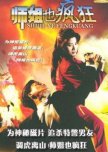
Esta resenha pode conter spoilers
Absurd and lewd
This Yes Madam is not to be confused with Cynthia Khan's other movie Yes Madam 2 (1988) or Michelle Yeoh's Yes Madam (1985). While Cynthia Khan did play a cop, the movie veered into the fantasy realm with the most oddball villains and good guys. The story refused to be taken seriously resulting in a headache of a viewing experience trying to make sense of the haphazard script and even worse acting.This review will be short as the movie was not entertaining for me. Cynthia Khan played a cop for the A-Team and her boyfriend was a security guard who happened to break up a criminals' fight and ended up with a book filled with money. The bad guys wanted the book back. The boyfriend's family ended up being kidnapped by the bad guys in exchange for the book. Two gangs of bad guys double-crossed each other making an exchange for the merchandise resulting in the most ridiculous and poorly choreographed fight scenes I've ever seen.
The bad and the strange: Starting first with the boyfriend's family---The sister was over the top strange. She was shown making an elaborate meal for the cat but only ordered delivery pizza from a guy dressed as Superman for the family with a stack of boxes from previous meals sitting in the corner. One young boy dressed like Goku (Dragonball) and practiced kung fu in his room. The other lecherous child had the magical power to steal women's bras and panties off their bodies. And for some reason there was a pin-up poster of a half-naked woman hanging in the dining room behind the dining table. Khan's boss was also pervy. The bad guys looked like they were cos-playing anime baddies wearing strange costumes and hair pieces. Several of them had face paint or huge owl-like eyebrows.
The story made no sense, beginning with the first random fight right up until the final scene. The writers threw in the most arbitrary things which made scenes even more chaotic and incomprehensible. This is a movie only for those who love absurd Taiwanese films with lewd humor. For me, this movie was a beating and I am happy to have it in my rearview mirror.
3/19/23
Esta resenha foi útil para você?
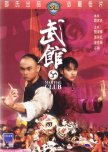
Esta resenha pode conter spoilers
Miss Manners for martial arts
Martial Club followed Wong Fei Hung from goofball show-off to accomplished and more thoughtful fighter. Though the story wasn't too compelling it had some interesting fights in it. Gordon Liu, Robert Mak, and Kara Hui as three young fighters from two different schools had a nice, if not too dynamic camaraderie. If it feels like I'm damning this movie with faint praise, I probably am.The movie opens with an elaborate Lion Dance that is interrupted by a rival school led by Lu Zheng Fu (Chu Tit Wo). Wong Fei Hung's father (Ku Feng) and Master Zheng Tian Shou (Wilson Tong) attempt to keep the peace with the troublesome school. Meanwhile, Wong Fei Hung and his buddy Wang Jinlin (Mak) have more fun horsing around and picking fights with paid marks than they do actually training at their respective martial arts schools. Wang Juying (Hui) has a crush on WFH and runs interference for her brother Jinlin. Along comes Master Shan Xiong (Johnny Wang), a fellow from the North, and apparently all people from the north are considered rubes and less intelligent, in a classic case of miscommunication, he delivers a punishing blow to Jinlin, stopping short of killing him. The aftermath causes WFH to rethink his devil may care attitude and he decides to commit to his training while Jinlin continues to hang out at the brothels.
Shan joins up with an old acquaintance at the rival school to the other two. Think Slytherin vs Hufflepuff and Gryffindor. The shady Lu's son (King Lee) and his buddies trick Jinlin at the brothel and nearly beat him to death doing nothing to help the tension between the schools. Afterwards, Lu invites the others to a Cantonese opera and then tries to have them arrested for watching the show without a ticket. An extended free for all brawl takes place until Papa Wong shows up and calms everyone down. Master Shan refrains from any of the infighting and often restrains the Lu family when he can. He tests WFH on his martial courtesy and is pleased. The two have a "friendly" duel in the Zig Zag Alley which was the highlight of the film. And then a pointless and abrupt ending.
There was little to complain about with the fights. Gordon, Robert, Kara, and Johnny were a delight to watch as always. Hsiao Ho also showed up to add some acrobatics. Gordon and Johnny's duel showcased a number of styles well done, especially as the alleyway became narrower and narrower. Kara was an elegant fighter, even if her character was a bit of a hothead. Lau Kar Leung, King Lee, and Hsiao Ho provided the creative martial arts choreography managing to make huge brawls and one-on-one fights interesting.
The problem I had with the film was that there wasn't anything really at stake except for school pride. Though the Lu School played dirty, they never received any punishment for their misdeeds because everyone was too polite and more concerned with keeping the peace. The film was largely about loyalty and martial arts decorum, manners if you will. The implied crush between WFH and Juying had no spark to it, at least on his part. Kara looked like she was trying to make some chemistry happen, but came up against Gordon's stony façade. The friendship between WFH and Jinlin faded as WFH separated himself skill-wise. Other than WFH's seemingly overnight maturity and leap in abilities, nothing actually happened in this movie except for a bunch of fights between the schools.
What I did really like. When I see Johnny Wang's name on a cast list, I immediately know who the Big Bad or the Big Bad's #1 henchman is going to be. Johnny nearly always plays a villain. This is the first film I've ever seen him play a reasonable, fair, moral character and he did a good job at it. It's a shame he didn't have more morally righteous or at least gray characters. Seeing him smile at WFH's courtesy and abilities and not because he'd just murdered a small town was something I didn't know I needed.
Things I learned about the Lion Dance and life:
#1-A lion should never smell another lion's butt. #2-There should be no blinking at another lion. #3-Do not approach another lion with a raised foot.
Martial Club had quality fights and a likeable cast. It just lacked that special spark to make it memorable. Any kung fu movie that could tame Johnny Wang might be too polite for the genre. Who knew making an exciting movie about martial arts manners could be so difficult?
3/15/23
Esta resenha foi útil para você?

Esta resenha pode conter spoilers
Bromance times four!
Shaw Brother classic, The Crippled Avengers, may have had an unfortunate dated title, but it was old school kung fu fun. Director Chang Cheh wasn't too interested in realism instead he gave the audience a spectacle which at times more resembled a circus acrobatic act than it did a martial arts throw down. The Five Venoms (the group of actors, not the characters) teamed up once again, this time to take on a butchering bad guy.Hero Chen Kuan Tai's Black Tiger came home to find his wife dead and his son's arms cut off. He quickly dispatched the hatchet men and made a 180 into villainy. Through the years he provided his son, Lu Feng (Venom Centipede) with new and improved metal arms and hands, training him in the three Tiger Styles. Anyone who crossed them or spoke a word against them incurred their wrath. Johnny Wang acted as his chief enforcer Wan.
Along came the Venoms. Philip Kwok (Venom Lizard) made the mistake of looking at the son's metal hands and was blinded. Lo Meng (Venom Toad) spoke out against The Black Tiger's cruelty and was made mute and deaf. Sun Chien (Venom Scorpion) bumped into the son and lost his feet. Chiang Sheng (Venom apprentice) confronted the Black Tiger over his ruthlessness and had his skull crushed leaving him brain damaged. The four men made their way to each other and took Chiang home to his master. His master vowed to teach them kung fu styles to overcome their disabilities. For three years they trained before returning to confront their nemesis and his gang.
The training scenes were quite fun to watch as Chiang and Kwok were quick and acrobatic. Any fights with them and/or Lu Feng didn't need wire work because they could jump, flip and tumble with the best of them. Kwok's abilities with the metal pole and rings were fast and amazing to watch. Chiang always looked like gravity didn't apply to him as he tumbled off of and onto furniture. Lo Meng, though trained in martial arts tended to do more kung fu posing. The "Shaolin Hercules" never met a shirt he wanted to wear and liked to show off his muscles. Though one of the main four characters, Sun Chien and his metal legs tended to disappear for long stretches of time showing up just when someone needed a deadly kick. This was not Bruce Lee kung fu, it was kung fun, more theatrical than useful.
Though the main characters were all disabled, there was no humor at their expense. The best part of the whole film was the obvious camaraderie between the men as they relied on each other to survive. It was a buddy movie times four. Lo Meng's Wei and Kwok's Chen, the deaf man and the blind man, were quite heartwarming in their tactile friendship as they protected each other. For a 1970's kung fu movie, it was fairly sensitive, admittedly the bar was set pretty low on that subject, but at least there was some effort in the machismo genre.
I enjoyed this movie more than the Five Venoms and thought the fights were more original and at least some of them were quicker. The story wasn't afraid to embrace the ridiculous with things like a character having bionic arms who could shoot darts out of them. But it was the more human aspects of the movie that made it memorable. The friendships that developed between the main characters and the characters' growth were unusual for this genre where relationships often took a back seat to fighting. I found those aspects of the movie refreshing. For anyone who enjoys old kung fu movies, this is definitely one to give a try, even with the horrible title.
3/14/23
Esta resenha foi útil para você?

Esta resenha pode conter spoilers
Dorian "Flash Legs" Tan showed how he received his nickname in this movie as he kicked, slapped and popped with his fast and graceful kicks. Shaolin Deadly Kicks was an average Taiwanese martial arts film with a strong cast and consistent story. Dorian had a nice screen charisma to smooth over some of the weaker moments in the film.Dorian's Hung Yi hunts down the scattered members of the Eight Dragon gang. Three years ago they had stolen a secret octagonal treasure map and divided it among the 8 gang members. Holy story convenience Batman! More than bringing in the bad guys he's trying to collect the pieces of the map and return it to the temple the gang stole it from. The pieces don't come easy with numerous fights along the way. Dorian faced harm from farm implements, deadly wheel barrows, swords, explosives, hidden weapon traps, chains, bamboo spears, ropes, leap frog kung fu and a giant. Along the way he meets the comely and dangerous Doris Lung, daughter of one of the gang members.
The story, while thin, stayed on track and remained somewhat comprehensible, something more than a few martial arts movies from this time can't boast. Like many movies filmed in Taiwan, this title is in desperate need of restoration. It was dark, faded and grainy. The fights were typical of the 70's, slow and jerky yet the actors made them entertaining. They did make use of wire work, but the majority of fighting was on the ground. Instead of kung fu, Dorian used taekwondo, with his extremely limber and strong legs. He could pop, pop, pop up the bad guys' bodies and then slap or kick them with his feet in their faces.
Dorian is not the most emotive actor but he's entertaining to watch. Lo Lieh showed up as a scarred bad guy and he always brings energy to his supporting roles. Wang Hsieh made his menacing appearance as a deadly member of the Dragon gang. Doris Lung was a nice love interest who could hold her own in a fight. Lung Fei, Tsai Hung, Chin Kang, and Lu Ti rounded out the main partial map carrying members of the gang. There was a nice variety of characters in the gang. A few were completely murderous and others had come to have regrets about the life they had lived.
Things I learned from this movie. #1 Never turn your back on your mortal enemy. #2 Never carry a pocketful of fragile explosives to a fight.
Shaolin Deadly Kicks won't go down as one of the great kung fu flicks from the 70's but for a bargain basement Hong Kong movie filmed in Taiwan it was entertaining enough even with a rather abrupt ending. Probably of most interest to Dorian Tan fans. As always, I grade these old martial arts movies on a curve.
3/11/23
Esta resenha foi útil para você?

 55
55 217
217 11
11






















